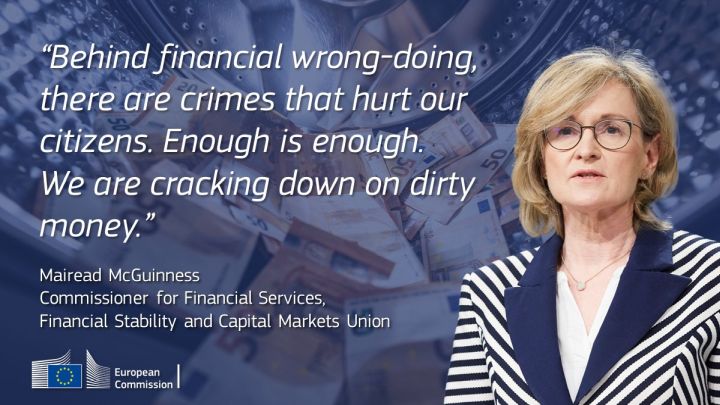EU Cracks Down on Crypto; No More Anonymous Transactions?
The European Commission intends to limit the anonymity of transactions using cryptocurrencies. The reason is that they are used for money laundering and other financial crimes.

Due to the "anonymous" nature of cryptocurrencies, they are often associated with fraud, money laundering and other financial crimes. It is possible to trace virtual money transfers, but the full details of the initiator and recipient in the transaction chain usually remain unknown. To prevent this, the European Commission plans to ban anonymous transfers and cryptocurrency wallets.
The EC proposed measures this week to protect EU citizens and its financial system by introducing anti-money laundering and anti-terrorist financing rules. The proposed package includes four elements:
- The creation of a new EU authority for battling money laundering and terrorist financing;
- Implementation of new rules affecting the areas of beneficial ownership and due diligence;
- Updating the existing 2015/849/EU directive on the prevention of the use of the financial system for money laundering or terrorist financing with new provisions on national supervisory authorities and entity financial intelligence;
- Amending of the 2015 regulation on information accompanying funds transfers to track cryptocurrency transactions.

Most of these proposals are aimed directly at large companies, but some of them could also affect the ordinary people who hold cryptocurrency assets. Under the European Commission's new proposal, service providers will be required to record customer information. This will ensure that all transfers are fully traceable from source to recipient, preventing "their possible use for money laundering or terrorist financing."
Mairead McGuinness, acting EU Commissioner for Financial Services, wrote on the matter on her Twitter account:
If the proposal is approved, cryptocurrency service providers handling asset transfers or traditional bank transfers will have to provide full details of the payer - including address, date and place of birth, and even personal document numbers.
Before the idea becomes law, it must be approved by the European Parliament and member states. It is not known when the vote on this will take place, as it is expected that the process could take up to 2 years.
- Another country takes on loot boxes in games to protect underage players
- Data of 700 million EA players might end up in the hands of a „repressive, authoritarian government.” Senators sound the alarm
- They say that violent games cause more aggression. That's why the Mexican government wants extra fees from players for GTA and Call of Duty
0

Author: Adam Krolak
Computer geek, enthusiast of older and forgotten productions with soul (mainly RPG and strategic games), which he still plays to this day. He often returns to the 8-bit games that he used to play in his childhood. Enjoys traveling and learning languages. Interested in Asia, with a focus on Indonesia, Japan, and Korea. Likes Asian cinema, Indonesian cuisine, and fantasy books.
Latest News
- 12 million players are celebrating, but not everyone will get a gift. ARC Raiders devs give away pickaxes and bans
- Cyberpunk 2077 creator explains why male V suddenly disappeared from ads
- Court sides with GTA 6 devs. Former Rockstar Games employees suffer a painful blow in their fight for money
- 2 Xbox Game Pass games. Star Wars: Outlaws comes with a newly released zombie apocalypse simulator
- „Bloodborne is a special game for me.” Dark Souls father's honest declaration is painful and hopeless, but true

